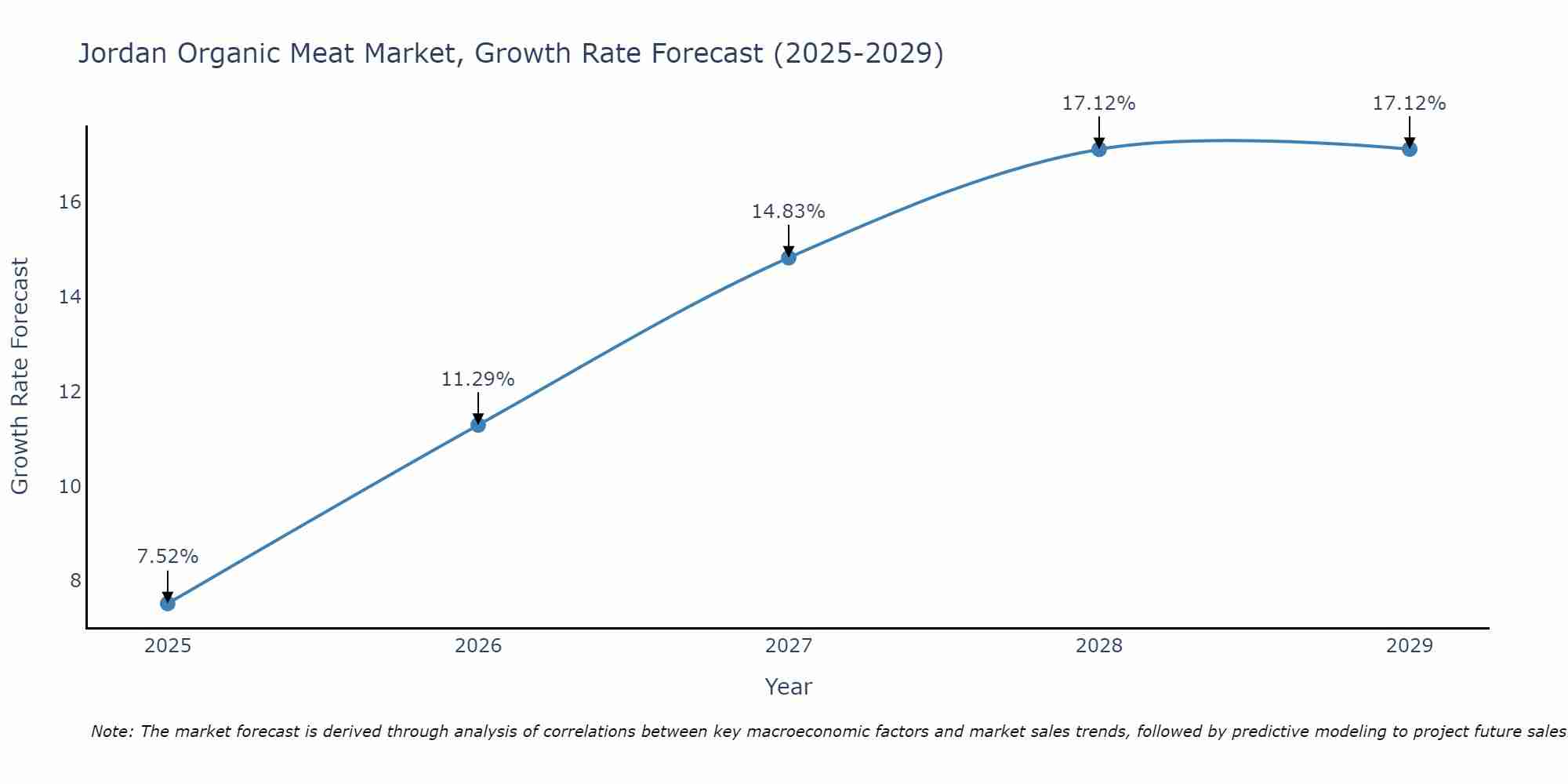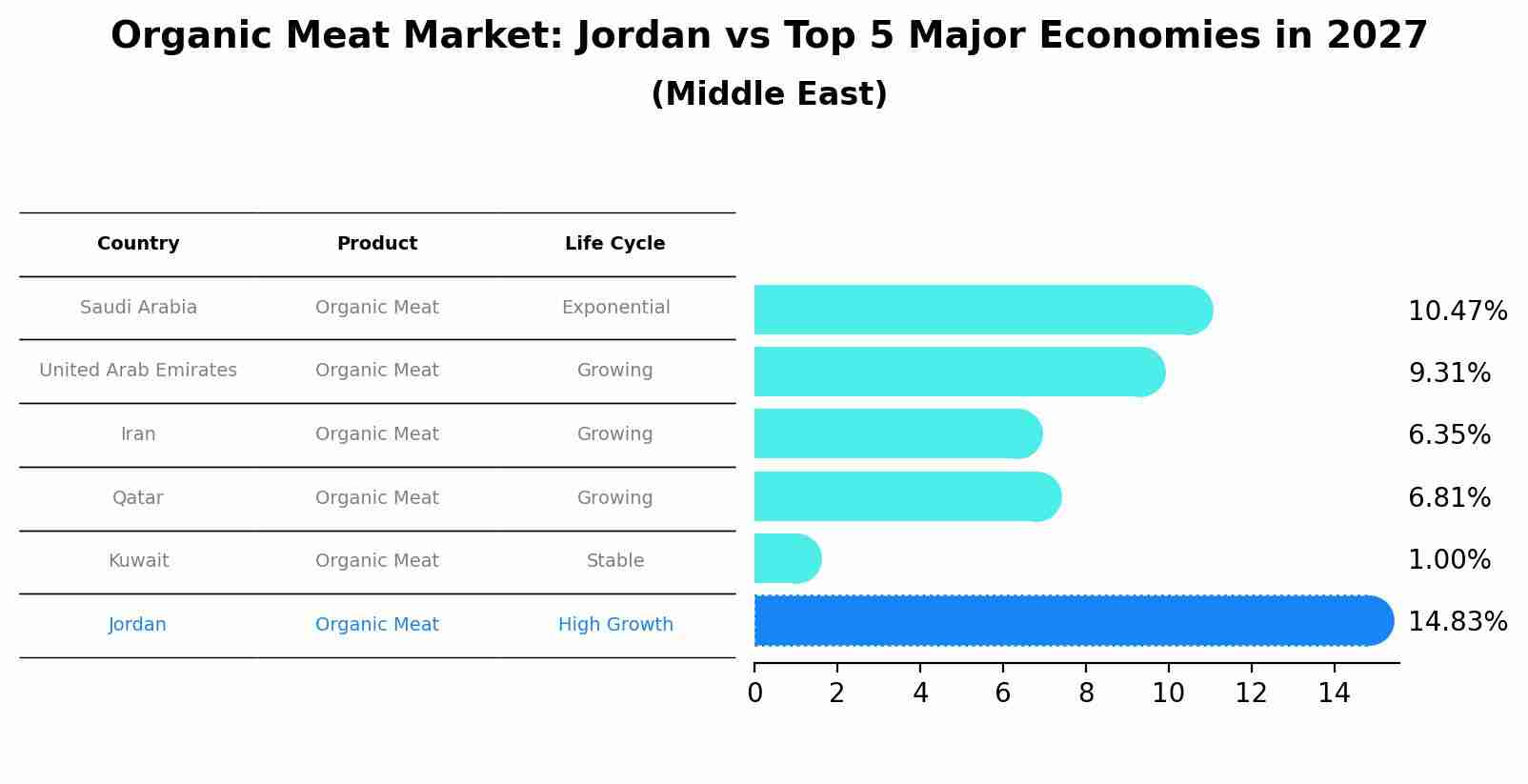Jordan Organic Meat Market (2025-2031) Outlook | Forecast, Share, Revenue, Companies, Value, Size, Trends, Industry, Growth & Analysis
| Product Code: ETC383626 | Publication Date: Aug 2022 | Updated Date: Jul 2025 | Product Type: Market Research Report | |
| Publisher: 6Wresearch | Author: Bhawna Singh | No. of Pages: 75 | No. of Figures: 35 | No. of Tables: 20 |
Jordan Organic Meat Market Size Growth Rate
The Jordan Organic Meat Market is likely to experience consistent growth rate gains over the period 2025 to 2029. Commencing at 7.52% in 2025, growth builds up to 17.12% by 2029.

Organic Meat Market: Jordan vs Top 5 Major Economies in 2027 (Middle East)
The Organic Meat market in Jordan is projected to grow at a high growth rate of 14.83% by 2027, highlighting the country's increasing focus on advanced technologies within the Middle East region, where Saudi Arabia holds the dominant position, followed closely by United Arab Emirates, Iran, Qatar and Kuwait, shaping overall regional demand.

Jordan Organic Meat Market Synopsis
The Jordan organic meat market is experiencing significant growth due to increasing consumer awareness about the benefits of organic food consumption. Consumers are becoming more conscious of the health and environmental advantages of organic meat, leading to a higher demand for such products in the market. The market is witnessing a rise in organic meat producers and suppliers who are focusing on meeting this growing demand by offering a variety of organic meat products. Government initiatives to promote organic farming and sustainable agricultural practices are also contributing to the expansion of the organic meat market in Jordan. With a favorable economic outlook and a shift towards healthier lifestyles, the Jordan organic meat market is poised for further growth and development in the coming years.
Jordan Organic Meat Market Trends
The Jordan Organic Meat Market is witnessing a growing demand for organic and ethically sourced meat products among health-conscious consumers. Consumers are increasingly seeking organic meat options due to concerns about environmental sustainability, animal welfare, and personal health. The market is experiencing a shift towards organic farming practices that prioritize natural feed, hormone-free diets, and pasture-raised livestock. Jordanian consumers are willing to pay a premium for high-quality organic meat products, driving retailers and producers to expand their organic meat offerings. The market is also seeing a rise in online platforms and specialty stores catering to the growing demand for organic meat. Overall, the Jordan Organic Meat Market is poised for continued growth as consumers prioritize sustainable and healthy food choices.
Jordan Organic Meat Market Challenges
In the Jordan organic meat market, several challenges are faced. These include consumer awareness and understanding of organic products, high production costs due to organic farming practices, limited availability of organic feed, and the lack of government support and regulations specific to organic meat production. Additionally, competition from conventional meat products and imported organic meat pose challenges for local organic meat producers in terms of pricing and market share. Building trust and credibility among consumers, ensuring consistent supply, and navigating the complexities of certification and labeling requirements are also significant hurdles in the Jordan organic meat market. Overall, overcoming these challenges requires strategic marketing efforts, investment in sustainable practices, and collaboration with stakeholders across the organic meat supply chain.
Jordan Organic Meat Market Investment Opportunities
The Jordan Organic Meat Market presents promising investment opportunities due to the increasing consumer demand for high-quality, ethically sourced meat products. With a growing awareness of health and sustainability issues, there is a rising preference for organic meat that is free from antibiotics, hormones, and other harmful additives. Investors can consider opportunities in organic livestock farming, processing facilities, distribution networks, and retail outlets to capitalize on this trend. Collaborating with local farmers to promote organic practices and certification can also be a strategic move to establish a competitive advantage in the market. Additionally, leveraging technology for traceability and transparency in the supply chain can further enhance consumer trust and drive sales in the Jordanian organic meat sector.
Jordan Agar Market Government Policies
The Jordanian government has implemented various policies to support the organic meat market in the country. These policies include providing financial incentives and subsidies to organic meat producers, promoting sustainable agricultural practices, and ensuring compliance with organic certification standards. Additionally, the government has established regulations to monitor and enforce organic labeling and marketing practices to protect consumers and promote transparency in the market. Overall, the government`s focus on promoting organic agriculture and supporting organic meat production reflects a commitment to sustainable practices and environmental conservation in Jordan`s food industry.
Jordan Organic Meat Market Future Outlook
The future outlook for the Jordan Organic Meat Market is promising, with increasing consumer awareness and demand for organic and sustainably sourced products. Factors such as rising health consciousness, concerns about food safety, and a growing preference for ethically produced food are driving the growth of the organic meat market in Jordan. Moreover, the government`s initiatives to support organic farming practices and the implementation of stricter regulations on conventional meat production are further boosting the market. With a focus on quality, transparency, and environmental sustainability, the Jordan Organic Meat Market is expected to experience steady growth in the coming years, presenting opportunities for both domestic producers and international players looking to enter the market.
Key Highlights of the Report:
- Jordan Organic Meat Market Outlook
- Market Size of Jordan Organic Meat Market, 2024
- Forecast of Jordan Organic Meat Market, 2031
- Historical Data and Forecast of Jordan Organic Meat Revenues & Volume for the Period 2021 - 2031
- Jordan Organic Meat Market Trend Evolution
- Jordan Organic Meat Market Drivers and Challenges
- Jordan Organic Meat Price Trends
- Jordan Organic Meat Porter's Five Forces
- Jordan Organic Meat Industry Life Cycle
- Historical Data and Forecast of Jordan Organic Meat Market Revenues & Volume By Type for the Period 2021 - 2031
- Historical Data and Forecast of Jordan Organic Meat Market Revenues & Volume By Poultry for the Period 2021 - 2031
- Historical Data and Forecast of Jordan Organic Meat Market Revenues & Volume By Beef for the Period 2021 - 2031
- Historical Data and Forecast of Jordan Organic Meat Market Revenues & Volume By Pork for the Period 2021 - 2031
- Historical Data and Forecast of Jordan Organic Meat Market Revenues & Volume By Others for the Period 2021 - 2031
- Historical Data and Forecast of Jordan Organic Meat Market Revenues & Volume By Application for the Period 2021 - 2031
- Historical Data and Forecast of Jordan Organic Meat Market Revenues & Volume By Food Services for the Period 2021 - 2031
- Historical Data and Forecast of Jordan Organic Meat Market Revenues & Volume By Retail for the Period 2021 - 2031
- Historical Data and Forecast of Jordan Organic Meat Market Revenues & Volume By Distribution Channel for the Period 2021 - 2031
- Historical Data and Forecast of Jordan Organic Meat Market Revenues & Volume By B2C for the Period 2021 - 2031
- Historical Data and Forecast of Jordan Organic Meat Market Revenues & Volume By B2B for the Period 2021 - 2031
- Jordan Organic Meat Import Export Trade Statistics
- Market Opportunity Assessment By Type
- Market Opportunity Assessment By Application
- Market Opportunity Assessment By Distribution Channel
- Jordan Organic Meat Top Companies Market Share
- Jordan Organic Meat Competitive Benchmarking By Technical and Operational Parameters
- Jordan Organic Meat Company Profiles
- Jordan Organic Meat Key Strategic Recommendations
Frequently Asked Questions About the Market Study (FAQs):
- Single User License$ 1,995
- Department License$ 2,400
- Site License$ 3,120
- Global License$ 3,795
Search
Thought Leadership and Analyst Meet
Our Clients
Related Reports
- Afghanistan Apparel Market (2026-2032) | Growth, Outlook, Industry, Segmentation, Forecast, Size, Companies, Trends, Value, Share, Analysis & Revenue
- Canada Oil and Gas Market (2026-2032) | Share, Segmentation, Value, Industry, Trends, Forecast, Analysis, Size & Revenue, Growth, Competitive Landscape, Outlook, Companies
- Germany Breakfast Food Market (2026-2032) | Industry, Share, Growth, Size, Companies, Value, Analysis, Revenue, Trends, Forecast & Outlook
- Australia Briquette Market (2025-2031) | Growth, Size, Revenue, Forecast, Analysis, Trends, Value, Share, Industry & Companies
- Vietnam System Integrator Market (2025-2031) | Size, Companies, Analysis, Industry, Value, Forecast, Growth, Trends, Revenue & Share
- ASEAN and Thailand Brain Health Supplements Market (2025-2031) | Strategy, Consumer Insights, Analysis, Investment Trends, Opportunities, Growth, Size, Share, Industry, Revenue, Segments, Value, Segmentation, Supply, Forecast, Restraints, Outlook, Competition, Drivers, Trends, Demand, Pricing Analysis, Competitive, Strategic Insights, Companies, Challenges
- ASEAN Bearings Market (2025-2031) | Strategy, Consumer Insights, Analysis, Investment Trends, Opportunities, Growth, Size, Share, Industry, Revenue, Segments, Value, Segmentation, Supply, Forecast, Restraints, Outlook, Competition, Drivers, Trends, Demand, Pricing Analysis, Competitive, Strategic Insights, Companies, Challenges
- Europe Flooring Market (2025-2031) | Outlook, Share, Industry, Trends, Forecast, Companies, Revenue, Size, Analysis, Growth & Value
- Saudi Arabia Manlift Market (2025-2031) | Outlook, Size, Growth, Trends, Companies, Industry, Revenue, Value, Share, Forecast & Analysis
- Uganda Excavator, Crane, and Wheel Loaders Market (2025-2031) | Strategy, Consumer Insights, Analysis, Investment Trends, Opportunities, Growth, Size, Share, Industry, Revenue, Segments, Value, Segmentation, Supply, Forecast, Restraints, Outlook, Competition, Drivers, Trends, Demand, Pricing Analysis, Competitive, Strategic Insights, Companies, Challenges
Industry Events and Analyst Meet
Whitepaper
- Middle East & Africa Commercial Security Market Click here to view more.
- Middle East & Africa Fire Safety Systems & Equipment Market Click here to view more.
- GCC Drone Market Click here to view more.
- Middle East Lighting Fixture Market Click here to view more.
- GCC Physical & Perimeter Security Market Click here to view more.
6WResearch In News
- Doha a strategic location for EV manufacturing hub: IPA Qatar
- Demand for luxury TVs surging in the GCC, says Samsung
- Empowering Growth: The Thriving Journey of Bangladesh’s Cable Industry
- Demand for luxury TVs surging in the GCC, says Samsung
- Video call with a traditional healer? Once unthinkable, it’s now common in South Africa
- Intelligent Buildings To Smooth GCC’s Path To Net Zero


















